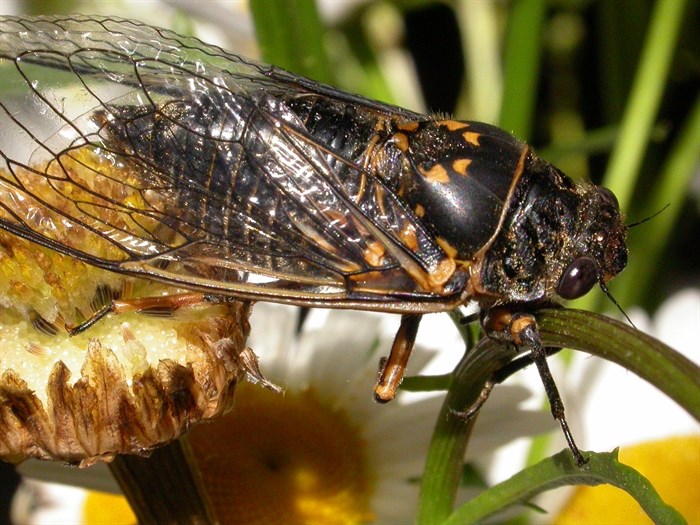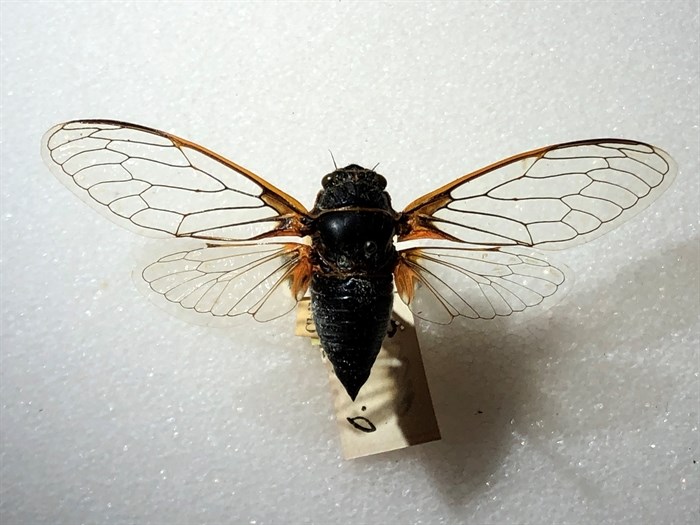
A member of the genus Okanagana.
Image Credit: SUBMITTED: Darren Copley
February 20, 2021 - 10:30 AM
They're pretty clumsy fliers and spend nearly their entire lives underground, and while their name is generally only used by scientists, the Okanagan Valley does have its own family of insects named after it.
Their genus name is Okanagana but they are more commonly known as cicadas.
They're often described as the sound of summer and there's no escaping the hum coming from the insects on a hot evening in July and August.
While the sound they make is very recognizable, the scientific name Okanagana, has never become a common term.
As with all things related to insects, there is not just one Okanagana cicada, and the word Okanagana actually refers to the insects' genus. In the genus Okanagana, there are more than 60 species across North America, largely in the U.S. but also here in the Okanagan Valley.
The Royal B.C. Museum collection records three species of Okanagana living in the Okanagan Valley - Okanagana bella, Okanagana occidentalis, and Okanagana rimosa. In B.C. there are nine species of cicadas from two genera – the Okanagana and the Platypedia. The genus Platypedia lives on the coast and sounds very different from the genus Okanagana.
While the names sound fancy, even scientists admit that to the naked eye they all look the same.
Stuart Brown, owner of Lake Country's The Bug Guys Pets and Exotics, said Okanagana favour ponderosa pines and live on hot and dry hillsides with Ellison and Kalamalka Provincial Parks being very popular places to find them in the summer.
Brown said Okanagana spend their lives underground in a larva stage which can last up to four years. They then develop wings and head to live in the pine trees. That's when the males start making a noise.
"(They're) calling for a mate... trying to lure a female to the location," Brown said.
Their life above ground doesn't last long and they only have about a month before they get eaten by something bigger.
Brown said Okanagana are about one-inch in size not including the wings and totally harmless.
"They're very odd-looking things," Brown said. "They are very bull-headed so their heads are very wide and then their abdomens are shaped down to a point... almost like a triangle."
They're also not very agile.
"They look very strange when they fly because they are such a big bulky animal," Brown said. "They're definitely clumsy fliers (and) you won't see them flying too often."
So why, when they live coast to coast across North America, are they named Okanagana?
University of British Columbia Okanagan biology professor Dr. Robert Lalonde said the genus name was established in 1905 by W.L. Distant.
Distant used the name Okanagana in a paper called ‘Rhynchotal notes,’ published in 1905 in the Annals and Magazine of Natural History, London.
While obtaining the actual scientific paper is no easy feat, it's assumed Distant established the genus name Okanagana to refer to the region or the Okanagan people.
According to the British Trust for Entomology, William Lucas Distant was a British entomologist who collected 50,000 insect specimens and worked for the British Museum. According to his obituary published in The Entomologist journal in 1922, he travelled widely but there is no mention that he ever came to Canada. The obituary says cicadas were his favourite group of insects.
So come the summer, instead of listening to the sound of the cicadas, residents of the Okanagan Valley can remind themselves they’re listening to the sound of the Okanagana.

Okanagana bella.
Image Credit: SUBMITTED: Royal B.C. Museum.
To contact a reporter for this story, email Ben Bulmer or call (250) 309-5230 or email the editor. You can also submit photos, videos or news tips to the newsroom and be entered to win a monthly prize draw.
We welcome your comments and opinions on our stories but play nice. We won't censor or delete comments unless they contain off-topic statements or links, unnecessary vulgarity, false facts, spam or obviously fake profiles. If you have any concerns about what you see in comments, email the editor in the link above.
News from © iNFOnews, 2021